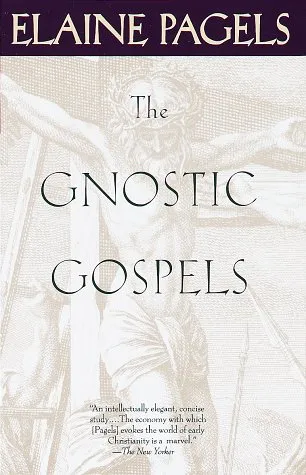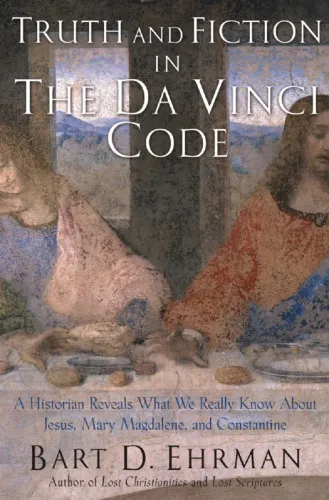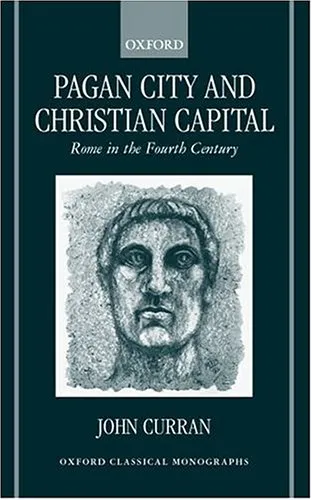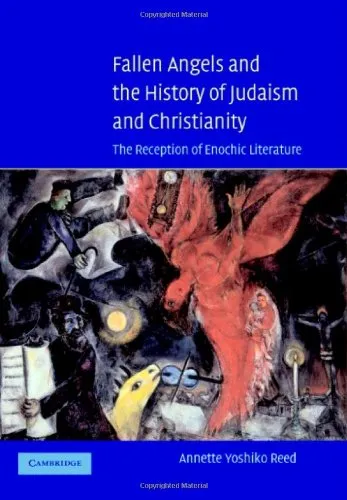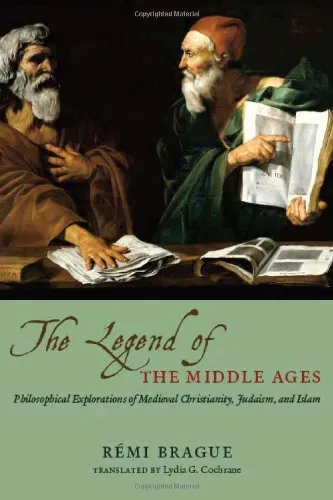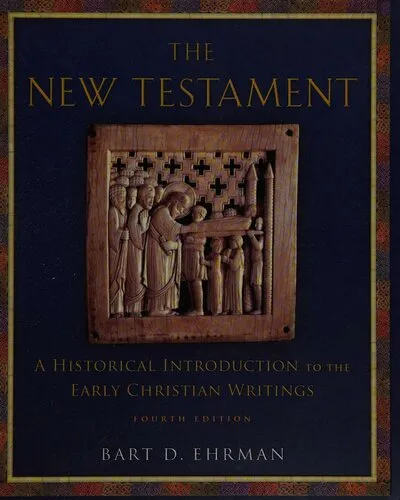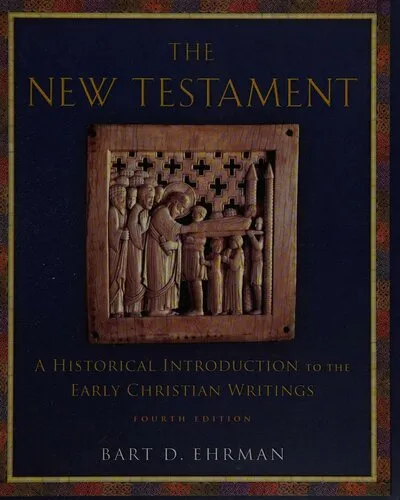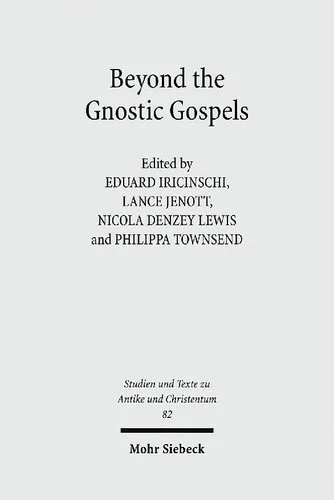The Gnostic Gospels
4.4
بر اساس نظر کاربران

شما میتونید سوالاتتون در باره کتاب رو از هوش مصنوعیش بعد از ورود بپرسید
هر دانلود یا پرسش از هوش مصنوعی 2 امتیاز لازم دارد، برای بدست آوردن امتیاز رایگان، به صفحه ی راهنمای امتیازات سر بزنید و یک سری کار ارزشمند انجام بدینکتاب های مرتبط:
معرفی کتاب "The Gnostic Gospels"
کتاب "The Gnostic Gospels" اثر الین پیگلس یکی از مهمترین کتب در زمینه مطالعات تاریخ مسیحیت و موضوعات مربوط به Gnosticism است. این کتاب اطلاعات جدید و عمیقی در مورد نگارشها و باورهای Gnostic ارائه میدهد که تا قبل از کشف کتابهای Nag Hammadi در دهه ۱۹۴۰ میلادی ناشناخته بود.
خلاصه کتاب
در این کتاب، الین پیگلس به کاوشهایی که در طی آن مجموعهای از متون ناشناخته و مهم Gnostic به نام "Nag Hammadi" در مصر کشف شد، میپردازد. این نوشتهها تفکرات و باورهای Gnostic را نشان میدهند که در دوران ابتدایی مسیحیت شایع بوده اما در نهایت توسط کلیسای رسمی به عنوان نوشتههای هرزی رد شد. پیگلس تفسیر دقیقی از این متون ارائه میدهد و تفاوتهای اصلی میان باورهای Gnostic و دکترینهای مسیحیت رسمی را تجزیه و تحلیل میکند. او نشان میدهد که چگونه رویکردهای مختلف به الهیات، نجات، و ماهیت خداوند در این متون منعکس شده است.
نکات کلیدی
- نگارشهای Gnostic چشمانداز متفاوتی به روایتهای اصلی مسیحیت ارائه میدهند که کمتر مورد بررسی قرار گرفتهاند.
- این متون بر اهمیت تجربه شخصی در درک الهیات و معنویت تأکید میکنند.
- پیگلس به بررسی تأثیر اجتماعی و تاریخی Gnosticism و چگونگی مواجهه کلیسا با این تفکرات میپردازد.
نقلقولهای مشهور از کتاب
"آنچه نوشتههای Gnostic ارائه میدهند، چشماندازی به دنیایی معنوی است که دربرابر قبول کردن صرف عقاید دینی، تجربه و معرفت شخصی را ارزشمند میشمارد."
"درک کردن این متون میتواند ما را به فکر درباره مرزبندیهای بین الهیات عمومی و شخصی در سفر معنویمان دعوت کند."
اهمیت این کتاب
کتاب "The Gnostic Gospels" بسیار مهم است زیرا دیدگاههای جدید و جزئیات تاریخی متفاوتی درباره سرچشمهها و انشعابات اولیه مسیحیت ارائه میدهد. این کتاب نه تنها برای محققین و دانشجویان الهیات، بلکه برای همگان که به معنویت و تاریخ علاقهمند هستند، منبعی ضروری محسوب میشود. با ارائه یک نگاه تازه به نوشتارها و باورهای مذهبی، این کتاب به خوانندگان اجازه میدهد تا سوالات عمیقتری درباره معنویت و الهیات مطرح کنند و درک تازهای از تاریخ پیچیده مسیحیت به دست آورند.
Introduction to 'The Gnostic Gospels'
In 'The Gnostic Gospels,' Elaine Pagels unravels the complexities of early Christianity through the lens of the Gnostic texts discovered in Nag Hammadi, Egypt, in 1945. These ancient texts reveal a form of Christianity that was eventually deemed heretical by emerging orthodox Christian traditions.
Detailed Summary of the Book
The Gnostic Gospels sheds light on the diversity of thought and belief in the early Christian era. These scriptures, which include gospels attributed to figures like Thomas, Mary Magdalene, and Judas, present a stark contrast to the canonical gospels. Pagels explores how the Gnostic views on divinity, salvation, and the role of church authority differed vastly from what became mainstream Christianity.
The central theme of 'The Gnostic Gospels' is the battle for legitimacy and authority within the early Christian community. The book delves into how the early church fathers, like Irenaeus and Tertullian, sought to consolidate Christian teaching and exclude Gnostic interpretations. Pagels explores the broader implications of these theological battles, suggesting that the suppression of Gnostic beliefs was not purely theological but also political.
Key Takeaways
- The discovery of the Nag Hammadi library challenged conventional understandings of early Christian doctrine.
- Gnostic Christianity offered a more personal and experiential approach to faith and spirituality.
- The conflict between Gnostic and Orthodox Christianity reflects deeper struggles for power and identity within the early church.
- Consideration of these texts enriches our understanding of religious diversity and theological development in early Christianity.
Famous Quotes from the Book
"These discoveries suggest that the early Christianity as we know it represented only a small selection of specific sources, chosen from among dozens of others."
"What we call Christianity, then, and what we identify as Christian tradition, actually represent only a small selection of specific sources, chosen from among dozens of others."
Why This Book Matters
'The Gnostic Gospels' is crucial for understanding not only the history of Christianity but also the dynamics of religious authority and the construction of orthodoxy. Elaine Pagels's work is seminal because it opens up the conversation about what might have been lost when Gnostic texts were suppressed. Her insights encourage readers to consider the multiplicity of early Christian voices, prompting a reevaluation of accepted doctrines and beliefs.
Moreover, the book offers a timeless exploration of how religious narratives are formed, controlled, and contested. In contemporary discussions about faith and the role of religion in society, Pagels's analysis provides a framework for examining how marginalized voices can offer rich alternative perspectives on spiritual experience.
دانلود رایگان مستقیم
شما میتونید سوالاتتون در باره کتاب رو از هوش مصنوعیش بعد از ورود بپرسید
دسترسی به کتابها از طریق پلتفرمهای قانونی و کتابخانههای عمومی نه تنها از حقوق نویسندگان و ناشران حمایت میکند، بلکه به پایداری فرهنگ کتابخوانی نیز کمک میرساند. پیش از دانلود، لحظهای به بررسی این گزینهها فکر کنید.
این کتاب رو در پلتفرم های دیگه ببینید
WorldCat به شما کمک میکنه تا کتاب ها رو در کتابخانه های سراسر دنیا پیدا کنید
امتیازها، نظرات تخصصی و صحبت ها درباره کتاب را در Goodreads ببینید
کتابهای کمیاب یا دست دوم را در AbeBooks پیدا کنید و بخرید
1519
بازدید4.4
امتیاز0
نظر98%
رضایتنظرات:
4.4
بر اساس 0 نظر کاربران
Questions & Answers
Ask questions about this book or help others by answering
No questions yet. Be the first to ask!
